






From the Chair
When George Cedric Metcalf (senior) died in 1998 and left his estate to the Foundation, we instantly became one of Canada’s largest private family foundations and our capacity for impact completely shifted. We knew we were in a position of tremendous responsibility — one that required a long view of how we could best steward and allocate our resources, as well as an exceptional person to lead us forward. Thankfully, we found that person in Sandy Houston.
Within the first few years of Sandy’s tenure, we established the three areas of focus for the Foundation that remain today: the performing arts, the environment, and poverty reduction. More importantly — guided by Sandy’s leadership — we shaped a set of principles to inform our work:
- aspire to contribute to positive change in individuals, organizations, civic engagement, public policy, and ultimately, in social values;
- work from the premise that a healthy and empowered nonprofit sector is fundamental to our society;
- make multi-year commitments with an understanding that organizations require financial predictability to plan and deliver effectively; and
- cultivate relationships premised on trust and mutual respect with the organizations we work with and support.
All this was outlined in Metcalf’s first biennial report spanning 2004–2005. In fact, I concluded my message in that inaugural report by saying: “I am looking forward to what the next 20 years may bring.”
And, here we are.
In those 20 years, Metcalf has lived out those early principles and has come to be recognized as a leading, thoughtful, effective, and collaborative foundation — this in large part can be attributed to Sandy’s leadership, to the outstanding team that has worked at the Foundation through the years and continues to do so, and to the board of directors. Although the board’s makeup has changed over the years, the dedication, passion, and deep thinking of each and every board member has been fundamental to the remarkable trajectory of Metcalf.
The start of Sandy’s tenure with Metcalf marked a significant time of transition for the Foundation. With his retirement earlier this year, we embarked once again on an important period of transition. Sandy has left a remarkable legacy at Metcalf, and on behalf of the board, we thank him for over two decades of profound, transformative leadership.
A transition from founding leadership is a pivotal and exciting time, and we are delighted to welcome Jamison Steeve into the role. We know Jamison will build on the strong foundation Sandy has established, and we look forward to the fresh perspectives he will bring to our work.
Through this transition, our mission remains the same — investing in people, ideas, and actions to build a just, healthy, and creative society — and we continue to be guided by a dedicated board, thoughtful advisors, and remarkable staff.
The long view ahead looks very promising from here, and I find myself saying, once again, I am looking forward to what the next 20 years may bring.

CHAIR
The Long View:
Sandy Houston
Through our biennial reports, we try to give a sense of what we have been doing over the last couple of years, illuminate some of the remarkable work we support, and explain the thinking that underpins it. I have always enjoyed the process of putting these reports together — looking across the range of our work and deciding what stories and design will best convey the theme we have chosen. This is the first report in which I have not had an active hand. Instead, I have been given the opportunity to reflect a little on the Metcalf Foundation’s development during my tenure — in other words, to take the long view.
That phrase “the long view” has some history at Metcalf — writing in our first biennial report, I used it in describing the fundamental values of the board:
“Our progress throughout has been informed and underpinned by the unwavering support and leadership of the Metcalf board and family. Their willingness to accept risk, their long view on the Foundation’s role and value and their comfort with uncertainty and ambiguity have been the cornerstones of our development.”
Private foundations usually emerge with a culture that is rooted in a family’s or a founder’s sensibility. This culture is then developed and tempered over time by the organization’s experiences and growing expertise. I am grateful for those early guiding values and how they shaped Metcalf’s approach over the past several decades. They reflect an understanding that our ability to take risk, to accept failure, to be brave and early, but also persistent and patient are a set of advantages that few other sectors enjoy in these impatient yet risk-averse times.
Our perspective emerges in part from the reality of our circumstances. Our resources are small relative to the challenges we are engaging, so we must be collaborative and strategic in fashioning alliances more commensurate with our shared ambitions. We have learned that change takes time, and that its path rarely runs straight. If we are focused and attentive to the implications of our efforts, we slowly gain insight into how to best contribute to the change we are seeking, and how to shift and adapt.
As I reflect on Metcalf’s path, five themes strike me as central to our approach.
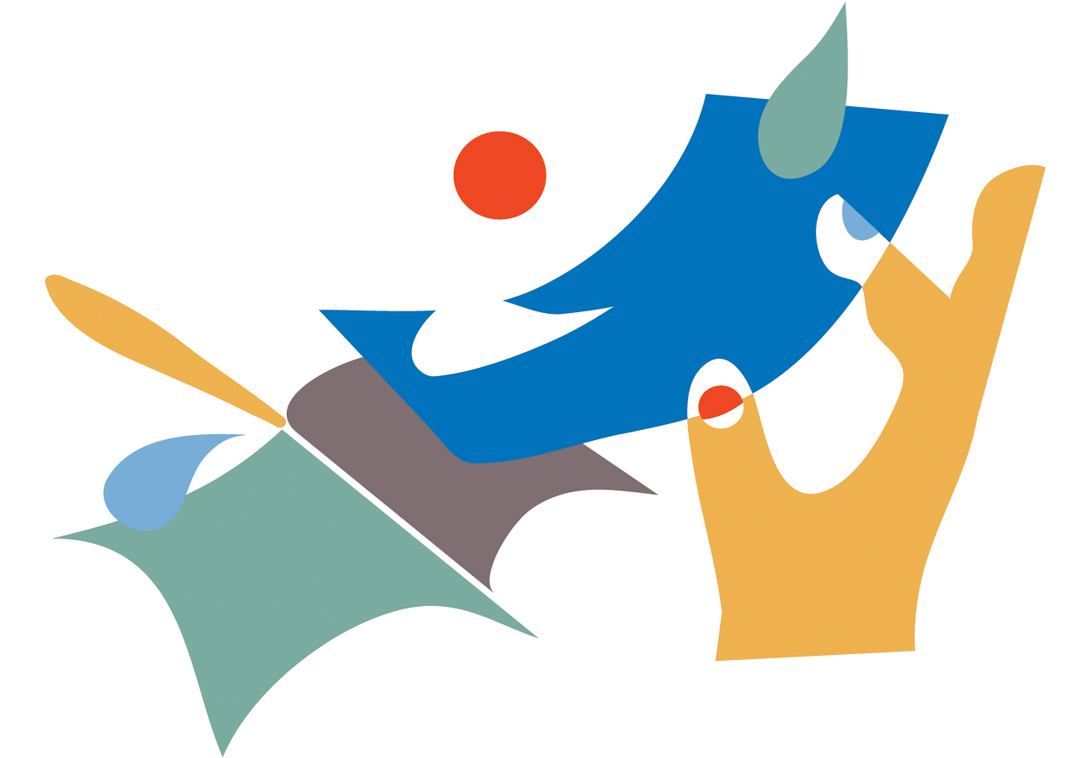
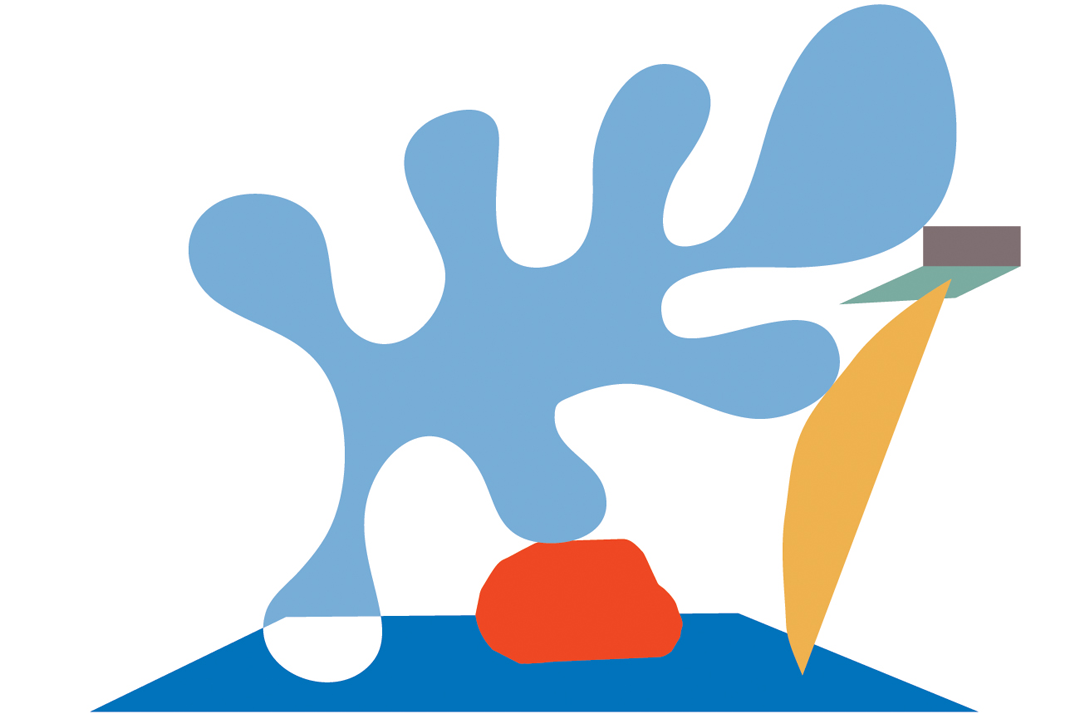
From our earliest days, we have been convinced of the necessity of investing in people at every stage of their careers. Nothing is possible without the unstinting efforts of sector leaders across the country. Providing opportunities for professional development, formal training, sabbaticals, fellowships, and internships has been a consistent thread through our work. In the Metcalf office, we have a piece of artwork that names all of the performing arts interns we supported up to 2012. Fast forward to today and many of those names are now mentors to the next generation of leaders at their own organizations, and recognized voices guiding the arts sector forward today.
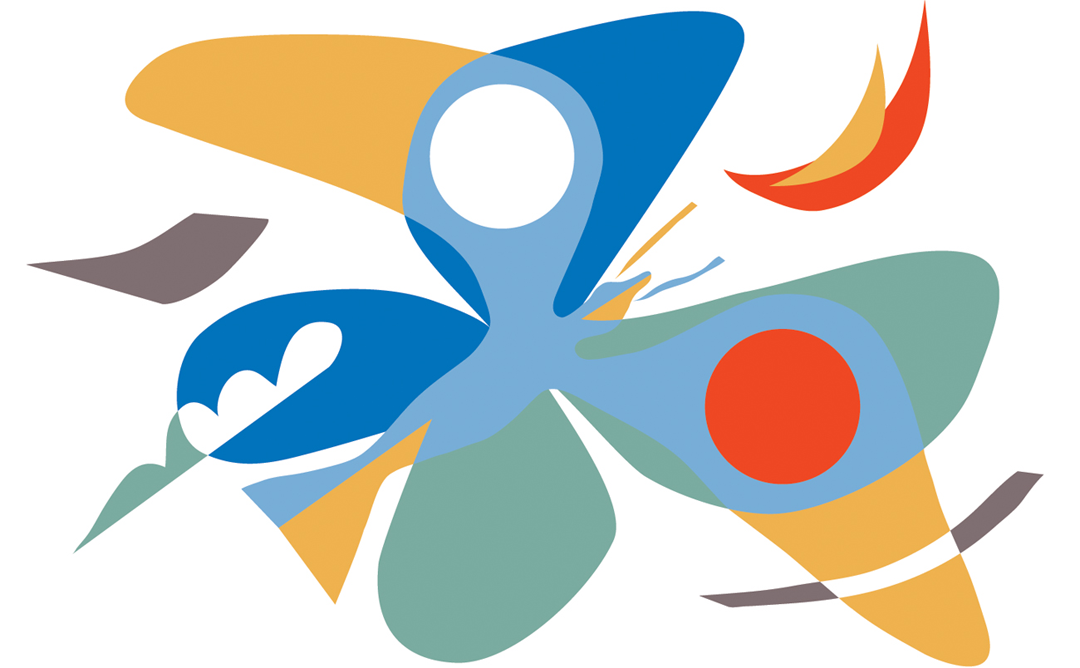
In all areas of our work, we try to cultivate relationships premised on trust and mutual respect. We know that when organizations, sectors, and communities come together to tackle complex challenges, real progress can be made. From a first-of-its-kind impact investment program to help land trusts permanently preserve local affordable housing, to expanding the arts and cultural sector’s capacity in policymaking, to the long-term protection and stewardship of lands and waters in the Northwest Territories — we have worked alongside diverse partners to leverage our strengths and enable lasting solutions.

Addressing complex issues often requires creativity and strong clear thinking rooted in practice. We have long held a space for new ideas and provided a platform for thought leaders. Metcalf Fellowships have given critical thinkers the opportunity to tackle hard questions and test promising ideas. Metcalf Fellows have been the early seeds that sprouted organizations like the Ontario Nonprofit Network (Lynn Eakin) and Park People (Dave Harvey), and shaped the public conversation and policy landscape when it comes to the working poor (John Stapleton) and the future of the cultural sector (David Maggs).
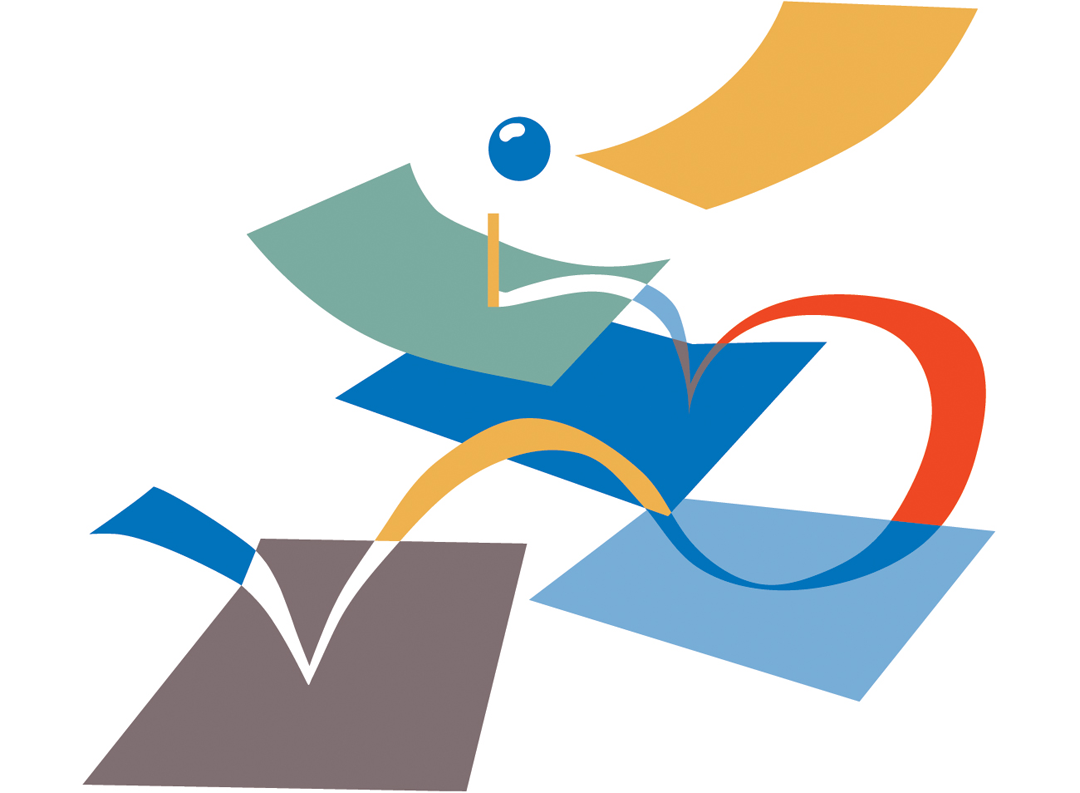
Meaningful progress unfolds over time, often along a complex and unpredictable trajectory, and requires investment and patience. From The Stop in Toronto scaling into Community Food Centres Canada, to the Workers’ Action Centre becoming the preeminent voice in advocating for decent work and workers’ rights in Ontario, there are clear benefits in providing promising organizations and leaders with the resources and time necessary to help them realize the fullness of their ambitions.
This emphasis on working through the long arc of change has likely been the biggest strength we have brought to our work. While we recognize the imperatives to support the urgent needs of today (and applaud those focused on this work), we believe Metcalf can best contribute through a sustained, thoughtful, long-term effort to identify and support viable solutions to systemic issues.
Collectively, we have sought to build a place that is thoughtful, open, rigorous and flexible, collaborative and modest, and intent on seeking a good outcome. We have managed to be early on some important issues and have consistently supported the risk-takers, agitators, and innovators. And we have surrounded ourselves with thoughtful advisors whose wisdom and connection to community infuses everything we do.
I am grateful to have been given a rare opportunity to contribute to the social good — to have worked with a terrific team and to have helped some of the most creative, committed, and tenacious people in our country achieve their purposes. It has been the great pleasure of my life to have occupied this role and worked in this place. While much has been accomplished to date, I have every confidence that even greater things lie ahead.

PRESIDENT & CEO
(2000–2024)
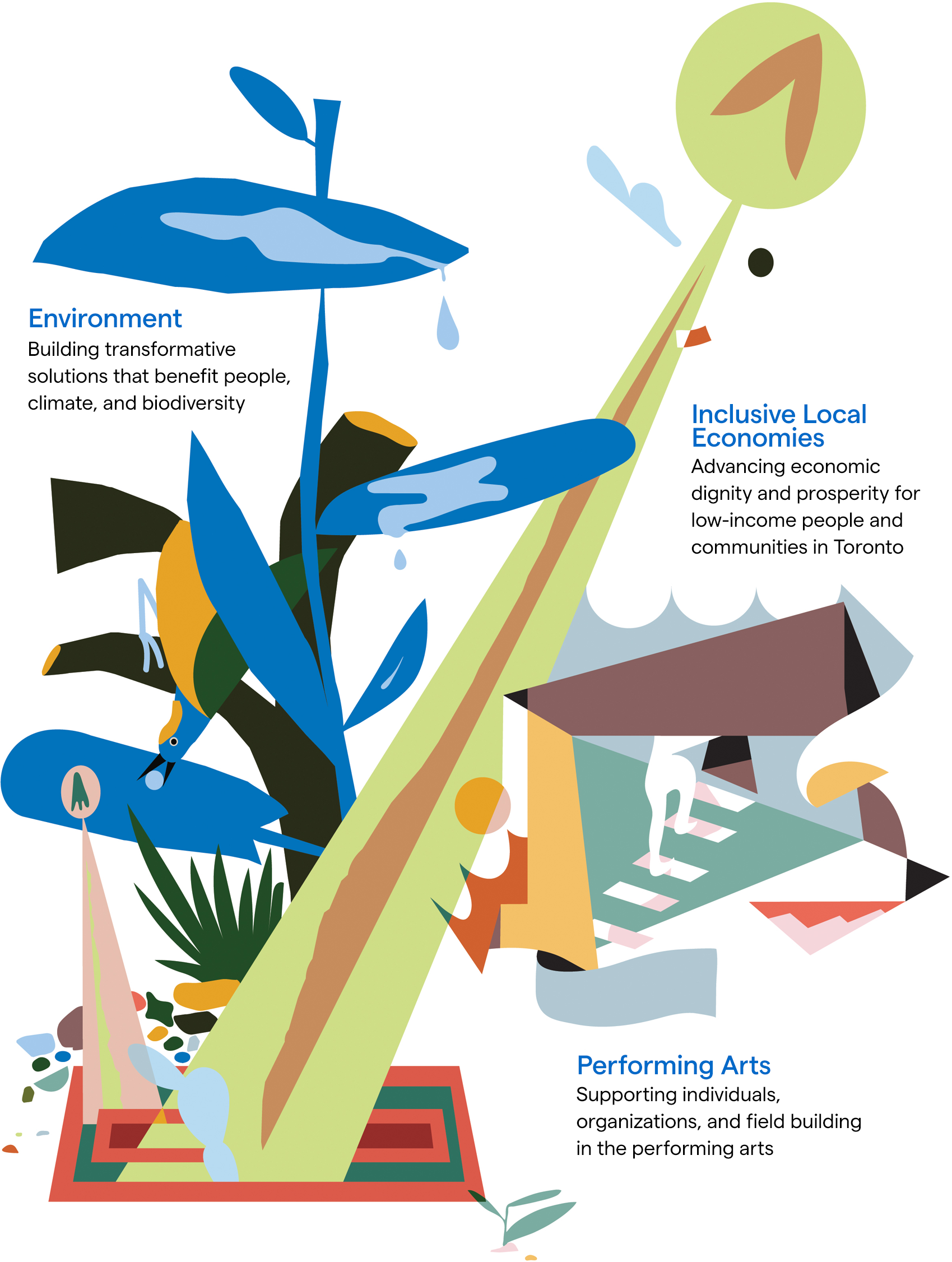
Metcalf Snapshot
Investing in people, ideas, and actions to build a just, healthy, and creative society.
It is a little bit daunting to take the helm of an organization that has had the same CEO for over two decades — an exceptional one at that. Sandy Houston has been the consummate leader, central to the fibre of this place and how we work. Our approach to collaboration and partnerships, our thinking around the world of philanthropy, and how we treat each other, all stem from him.
When the Metcalf Foundation Board of Directors launched the search for a person to succeed Sandy, they did so with their typical thoughtful, authentic, and principled approach. I am honoured to have been chosen and to take the reins at this time.
I was drawn to the role here at Metcalf because I believe this is one of the best jobs in the country. Few have the opportunity to work with an exceptional board and staff on fascinating and critical issues to improve our country and communities. I am an intellectually curious person who believes that collective problem solving is the best way forward on many of the issues that concern us. I want to do as much as I can for as many as I can for as long as I can. I believe in the power of good public policy. I believe that the philanthropic world can and should contribute more to the public interest and the public good.
For all these reasons — and many more — I am excited about the road ahead. Metcalf will continue its tradition of relationship-based philanthropy, built on the values laid down in years past. I will be looking for ways and means to increase our capacity for impact, as well as seeking new challenges to which we can contribute. Here’s hoping that when I write my message in the Metcalf biennial report in the years to come, I can reflect on our work with the same pride and humility that Kirsten and Sandy have steadfastly embodied.
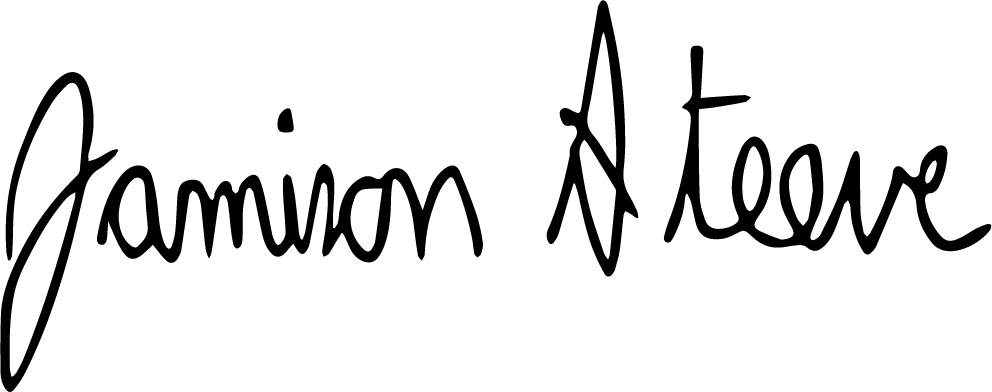
PRESIDENT & CEO

Environment
The view from here
From coast-to-coast-to-coast, we have a unique opportunity to lead the world on conservation. Across the country, leaders are working to safeguard some of our planet’s most remarkable life support systems. Now, more than ever, they need backing, including long-term, flexible funding support as they advance on-the-ground conservation, as well as policy-level efforts. Over the next decade, our Environment program will deepen its support for initiatives critical to the long-term success of conservation in Canada. We will continue to prioritize support for Indigenous-led conservation and stewardship, including Indigenous Protected and Conserved Areas and Indigenous Guardians programs. Additionally, we will expand our own role in convening, publishing research, and building partnerships and solutions to help sustain, scale, and accelerate conservation and stewardship efforts across the country.
In recent years, we celebrated several milestones, including Canada’s commitment to protect 30% of lands and waters by 2030, increased support for Indigenous-led conservation and stewardship, and major investments in nature-based climate solutions. Yet headwinds remain. The economic conditions to sustain conservation and stewardship at various scales are still emerging and uncertain, the capacity of the leaders and communities involved in this work is stretched, and the political context is ever evolving, creating challenges for long-term visions and plans. In the face of all this, we remain inspired and hopeful, and deeply committed to supporting incredible leaders working to conserve and steward lands and waters across Canada.
From compelling research to on-the-ground action, and from piloting new approaches to creating new spaces for collective action, we supported a range of important work over this period.
We maintained our long-standing support for timely research and analysis to fill critical knowledge gaps. A comprehensive carbon map uncovered fascinating new details about how much carbon is stored in Canada’s landscapes. A First Nations Carbon Toolkit met growing interest among First Nations to learn about forest carbon projects and how they can be used for protecting and restoring forests. And the power of northern peatlands as a global climate solution was highlighted in important new research. This work, and other new reports and resources, helped to guide and inform policy- and community-level actions across the country.
Convening around shared goals remained a central element of our work. Bringing leaders from government, philanthropy, community, and the wider sector together to build relationships and learn from one another created opportunities for collaboration. For example, the RAD Network, emerging from the Conservation through Reconciliation Partnership, hosted a visioning gathering that convened Indigenous leaders, Nations, and partners to co-create a shared vision for the network, discuss new and emerging economic pathways for Indigenous-led conservation, and identify opportunities for collective action.
Through support for in-depth research, reporting, and engaging coverage, we are helping to shed light on the people and communities who are advancing conservation initiatives across the country. The Narwhal’s Spirits of Place series was launched in 2023 to explore Indigenous-led conservation and the central role of Indigenous rights, leadership, language, and culture in guiding this work.
Increasingly, we are focused on areas that will help conservation and stewardship to thrive across Canada over the long-term. This includes tackling structural challenges in the conservation space and advancing approaches with the potential for outsized impact.
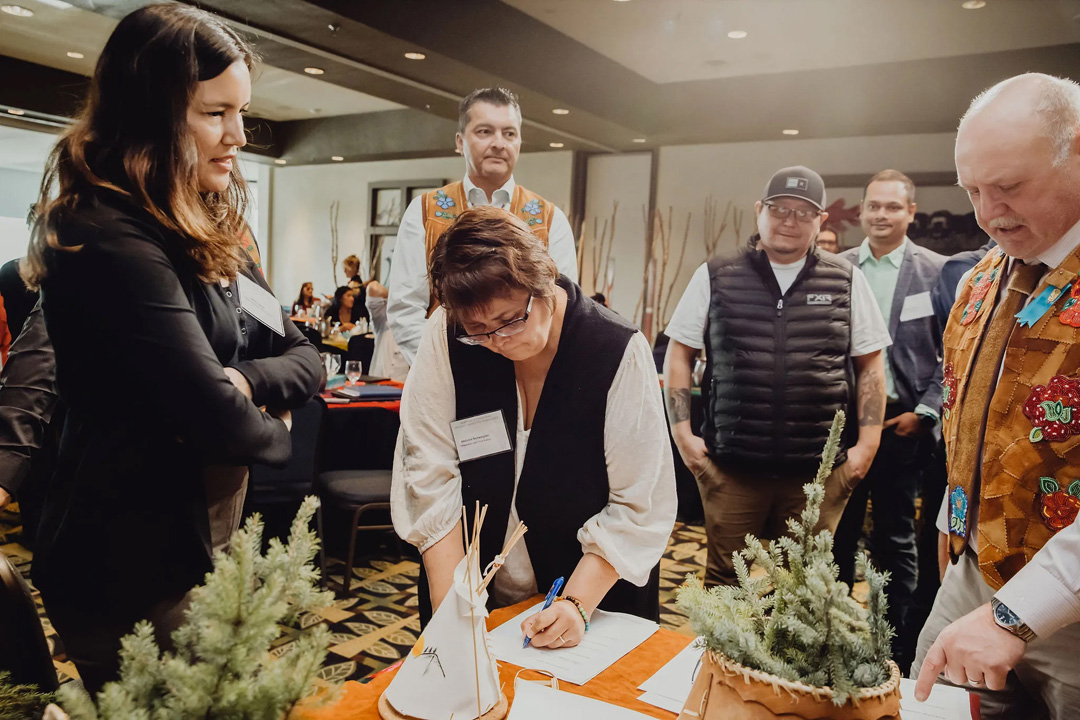
Partners signing the Northwest Territories Project Finance for Permanence framework agreement. Photo: Jamie Stevenson
Environment
The view from here
From coast-to-coast-to-coast, we have a unique opportunity to lead the world on conservation. Across the country, leaders are working to safeguard some of our planet’s most remarkable life support systems. Now, more than ever, they need backing, including long-term, flexible funding support as they advance on-the-ground conservation, as well as policy-level efforts. Over the next decade, our Environment program will deepen its support for initiatives critical to the long-term success of conservation in Canada. We will continue to prioritize support for Indigenous-led conservation and stewardship, including Indigenous Protected and Conserved Areas and Indigenous Guardians programs. Additionally, we will expand our own role in convening, publishing research, and building partnerships and solutions to help sustain, scale, and accelerate conservation and stewardship efforts across the country.
Partners signing the Northwest Territories Project Finance for Permanence framework agreement. Photo: Jamie Stevenson
Celebrating Major Milestones for
Indigenous-Led Conservation
Extraordinary Indigenous-led work is underway across the country. The Seal River Watershed Alliance — comprised of the Sayisi Dene First Nation, Northlands Denesuline First Nation, Barren Lands First Nation, and O-Pipon-Na-Piwin Cree Nation — has been leading efforts to permanently protect the Seal River Watershed in northern Manitoba as an Indigenous Protected Area. At over 50,000 square kilometres, the Seal River Watershed is one of the largest intact watersheds remaining in the world. It is central to the culture, language, and spirit of Indigenous communities in the region. The Alliance celebrated a historic conservation agreement when they signed a memorandum of understanding with the Government of Manitoba and the Government of Canada, committing all parties to a feasibility study for the Indigenous Protected Area, including an interim land withdrawal from mining claims while the study is underway.
At a national level, the Government of Canada announced $800 million in support of four Indigenous-led initiatives that are using a Project Finance for Permanence (PFP) model. Metcalf has been advising and supporting the development of a PFP in the Northwest Territories (NWT). Here, the Indigenous Leadership Initiative (ILI) is convening over 20 Indigenous governments, the governments of Canada and the NWT, and other partners to advance conservation and stewardship efforts across the territory. The NWT PFP will connect long-term stewardship, the protection of important lands and waters, and Indigenous ways of life with new economic opportunities based on community priorities. October 2023 marked an important milestone for the NWT PFP with the announcement that a framework agreement had been reached between partners. Once finalized, the NWT PFP will be one of the largest Indigenous-led conservation initiatives in the world.
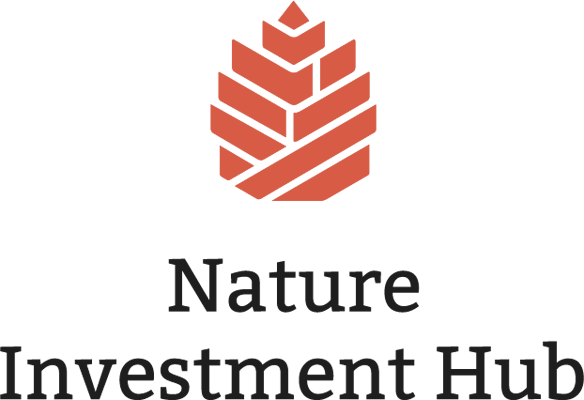
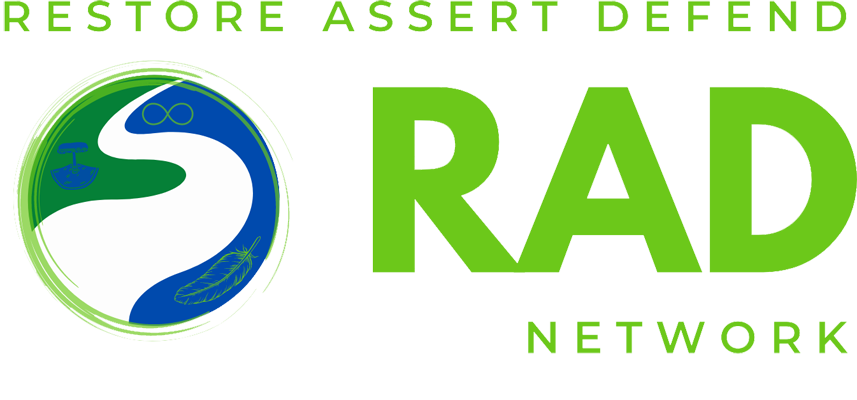
Strengthening Economic Pathways
for Conservation and Stewardship
Across Canada there is a diverse and fast-growing number of protected and conserved areas that are being pursued. In response, a whole other magnitude of investment is required. Metcalf funding helped launch the Nature Investment Hub and the RAD Network, two initiatives that seek to build economic pathways for conservation, restoration, and stewardship activities across the country. These initiatives will create much-needed space and support for convening and knowledge sharing, timely research and policy analysis, and efforts to harness and expand investments in protected and conserved areas, as well as other nature-based solutions.
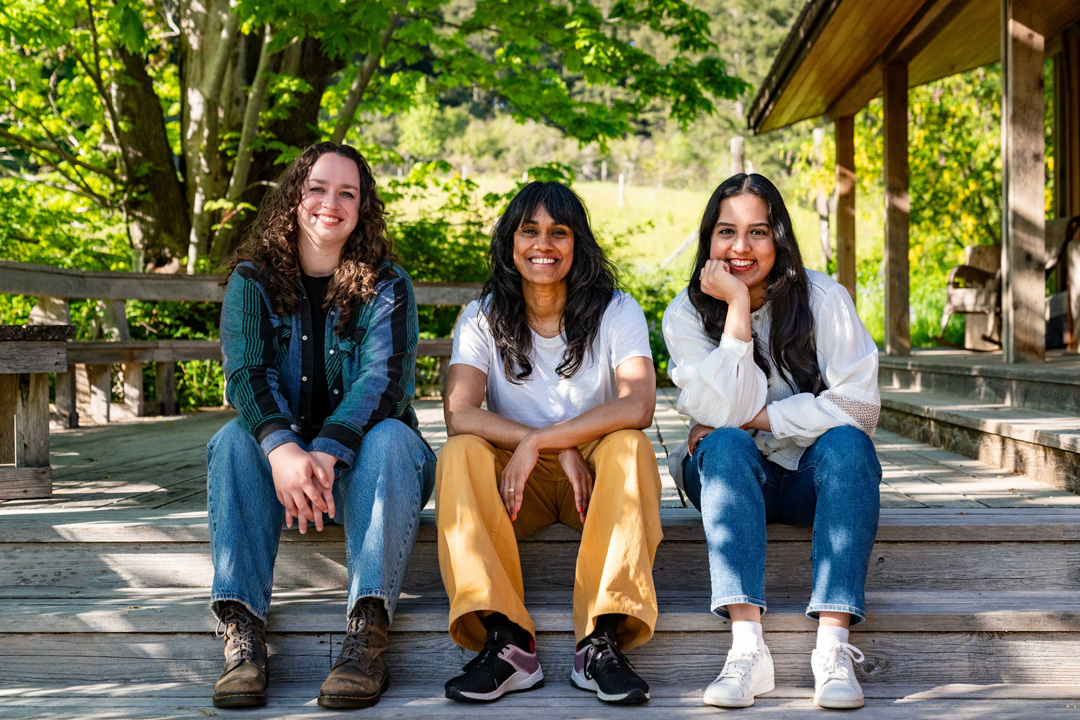
Emma McIntosh, Denise Balkissoon, and Fatima Syed from the Ontario bureau of The Narwhal. Photo: Ryan Wilkes / The Narwhal
The Narwhal, the Greenbelt, and the Power of Investigative Journalism
When The Narwhal, a leader in nonprofit environmental journalism in Canada, launched their Ontario bureau in September 2021, there was virtually no in-depth, investigative reporting on provincial climate and conservation issues. Working in partnership with the Toronto Star, The Narwhal subsequently broke the Greenbelt story that launched the Auditor General and Integrity Commissioner investigations. This reporting, recognized for its excellence with the 2023 Michener Award — Canada’s most prestigious journalism prize — eventually culminated in the provincial government’s announcement in September 2023 that it was reversing course and halting Greenbelt development. The remarkable turn of events demonstrates the power and necessity of high-quality public interest journalism, and its ability to drive change.

Inclusive Local Economies
The view from here
As we embark on the second decade of our Inclusive Local Economies program, we renew our commitment to building a just society, with a refreshed purpose of advancing economic dignity and prosperity for low-income people and communities in Toronto. The challenges facing our economy are complex and the headwinds in the years to come are daunting. Reducing working poverty, precarious employment, and neighbourhood inequities requires the well-aligned efforts by many. We will continue to invest in leaders and organizations that focus on building innovative models and influencing policy, nurture partnerships through relationship-based grantmaking, and make space for risk, learning, experimentation, and collaboration.
Over the last two years, we have witnessed hard-won victories on access to child care, increases to the minimum wage, and a renewed focus on affordable rental housing — all seeded by the long-term and relentless efforts of workers, community organizers, and policy advocates. We recognize that significant challenges persist, as economic conditions continue to exacerbate existing inequalities, and nonprofits are exhausted and underfunded. Even so, it is important not to lose sight of what has been achieved and what we have learned to strengthen and sharpen the strategy of our collective efforts.
In 2022, our Inclusive Local Economies program marked its 10-year anniversary. Over this time, we invested over $12 million in nearly 100 organizations and published 11 Metcalf Fellowship reports. In recognition of this milestone, we commissioned a special series with the award-winning outlet The Local, to explore some of the issues we have supported — migrant care workers, community land trusts, precarious work, and neighbourhood entrepreneurship — and shed light on the current state of these issues in our city through the voices of the people navigating the day-to-day challenges and championing solutions.
We also launched an in-depth review of the program, taking the opportunity to look back — assessing our approach, exploring our impact, and capturing strategic learnings — and to chart our path forward, using the insights and findings to inform our evolved program strategy.
The review engaged over 100 grantees and sector leaders through surveys, focus groups, key informant interviews, a reference group, and a convening. Our community was incredibly generous with their time — 60% of our current and past grantees participated in at least one form of data collection. We appreciated the honesty, vulnerability, detail, and insight in the feedback.
Grantees shared their struggles — organizational sustainability, rising inflation, shifting provincial and federal government priorities, and staff recruitment, retention, and training. We were encouraged to continue our relational, flexible, and strategic approach to grantmaking and to deepen our investments in convening, networking, and knowledge sharing. Key recommendations included extending and increasing grant support and refining our funding strategies and practices to better address income inequality and community inequities.
Reflecting at the 10-year juncture of our Inclusive Local Economies program, we were struck by the long runway that is often required to advance systemic responses to poverty. Organizations that make a significant impact have strong, committed leadership who share power and build the skills of low-income people — strengthening the voice and capacity of individuals, other organizations, and networks. Their strategic focus contributes to a broader change agenda. Being rooted in communities that hold them to account gives them a real-time understanding of the pitfalls and promise of partnerships, programs, and policies.
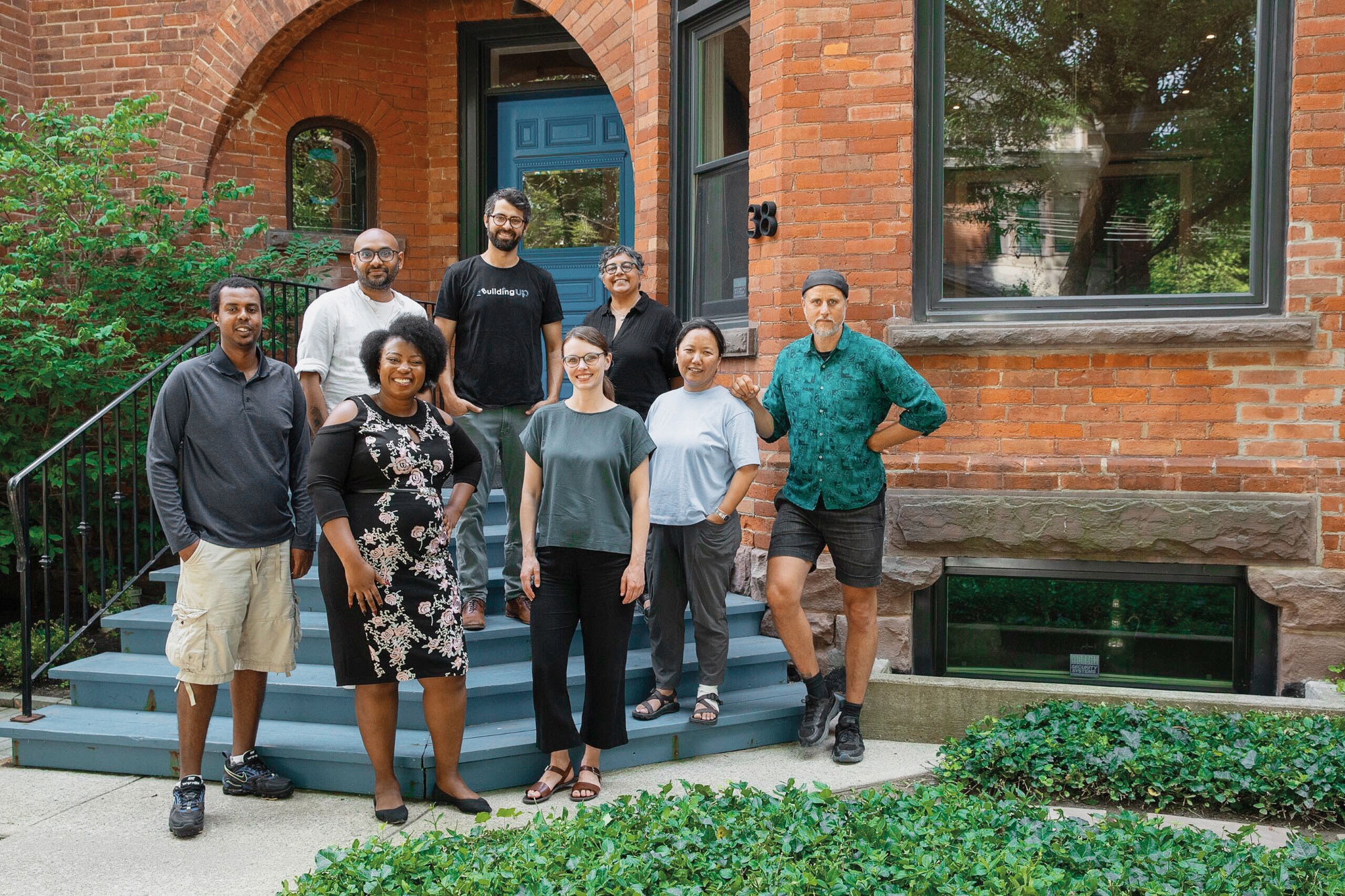
L-R back: Syed Hussan (Migrant Workers Alliance for Change), Marc Soberano (Building Up), and Deena Ladd (OEERC). L-R front: Kumsa Baker (Toronto Community Benefits Network), Rosemarie Powell (Toronto Community Benefits Network), Brynne Sinclair-Waters (OEERC), Tendon Dongtotsant (Neighbourhood Land Trust), and Joshua Barndt (Neighbourhood Land Trust). Photo: Britney Townsend
Inclusive Local Economies Program
The view from here
L-R back: Syed Hussan (Migrant Workers Alliance for Change), Marc Soberano (Building Up), and Deena Ladd (OEERC). L-R front: Kumsa Baker (Toronto Community Benefits Network), Rosemarie Powell (Toronto Community Benefits Network), Brynne Sinclair-Waters (OEERC), Tendon Dongtotsant (Neighbourhood Land Trust), and Joshua Barndt (Neighbourhood Land Trust). Photo: Britney Townsend
Grounded Leadership: Underpinning Strategic Experimentation and Success
Organizations require financial predictability to plan and deliver effectively, as well as time to think, collaborate, innovate, and develop leadership. A consistent message we heard from grantees in our Inclusive Local Economies program 10-year review was the importance of stable and flexible funding to underpin strategic experimentation and success.
We responded to this feedback by creating Grounded Leadership, a new funding envelope for Opportunities Fund grantees whose strategies focus on changing systems and building innovative models, with the potential for outsized impact on the lives of low-income people in Toronto.
By invitation only, Grounded Leadership enables organizations exemplifying the components of success identified through the review — strengthening the voice and capacity of leaders, organizations, and networks; improving economic opportunities for people; changing systems for the better; and making progress on long-term change — to access a three- to five-year runway of funding to enable and maintain momentum and traction in their strategies.
We invited the following organizations to join us in Grounded Leadership, committing approximately $2.5 million over the next three years to their strategies: Building Up – Raising the Roof, Migrant Workers Alliance for Change – OEERC, Neighbourhood Land Trust, Ontario Employment Education & Research Centre (OEERC), and Toronto Community Benefits Network – Labour Community Services.
These community organizations possess the leadership, credibility, and engagement with low-income people and communities, have strategies with the potential for significant and sustainable impact, and exhibit a strong understanding of the landscape. They provide leadership in the inclusive economic ecosystem and have demonstrated effective organizational capacity.
Grounded Leadership will also include additional annual resources for each organization to invest in enhancing the leadership skills of their staff and to support collective learning among their teams and communities — all with the aim of achieving more empowered and effective organizations.
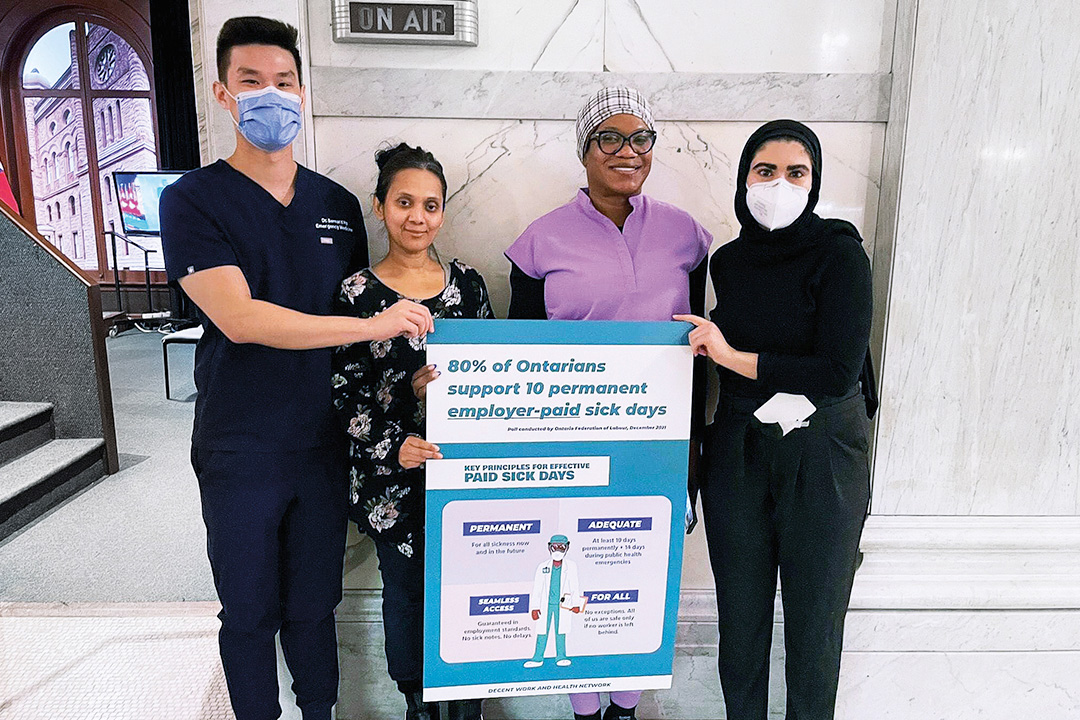
Dr. Bernard Ho (Decent Work and Health Network), Julie Chowdhury (Workers' Action Centre), Debra Slater (Empower PSW Network), and Yasmin Beydoun (Decent Work and Health Network) at Queen’s Park advocating for better working conditions. Photo: Decent Work and Health Network
Upstream Lab’s EMPOWER Project
Despite playing an important role in our health care system, personal support workers (PSWs) have the lowest pay and greatest employment precarity in the sector, typically working in non-unionized, part-time, temporary, and contract jobs. The majority of PSWs in the GTA are racialized and immigrant women. Upstream Lab’s EMPOWER project — coinciding with the pandemic — engaged over 600 PSWs in research that resulted in two peer-reviewed academic papers. Recommendations included better compensation and full-time permanent jobs with paid sick days. Created to put the research into action, the Empower PSW Network advocates for better working conditions for PSWs, and ultimately better care and outcomes for patients, families, and the health care sector.

Flaunt It Studio’s Creator Lab equipped with beginner-friendly to professional photography and videography equipment. Photo: Sariena Luy
Flaunt It Studio: An Inclusive Creative Coworking Space in Jane-Finch
In our work, we have seen how long-term relationships between communities and funders can influence neighbourhood resiliency. Over the last few years, Metcalf has been developing relationships with organizations and leaders from Jane-Finch, a neighbourhood undergoing a massive transformation with the development of the Finch West LRT and where a high concentration of Toronto’s working poor live. Located in the neighbourhood, Flaunt It is a grassroots youth-led artist collective that provides resources and opportunities for women, girls, and femmes from underserved communities to excel as artists, activists, entrepreneurs, and leaders. With the launch of Flaunt It Studio — Jane-Finch’s first creative coworking space — young entrepreneurs now have access to an affordable workspace, beauty salon, and state-of-the-art videography and photography studio.

Performing Arts
The view from here
In response to the pandemic, the arts and culture sector received substantial government support, facilitating a cautious return to in-person activities in early 2022. However, as pandemic-specific support concluded, long-standing challenges, such as shifting audience behaviors, and new challenges, like the rising cost of doing business, were brought into sharp relief. By late 2023, questions and concerns about the future pervaded the sector as numerous performing arts organizations faced cancellations and delays, highlighting the sector’s vulnerability and fragility.
Our approach to the state of the sector during this period was to double down on strategic interventions — addressing needs while resisting the pull of the status quo and supporting early promising ideas with system implications.
We continued to deliver and build on our Performing Arts program’s 20-year history of enhancing the vitality and viability of the sector in Toronto and across Ontario. Inherent in this approach was the recognition of a tension between the deep need for creating space for new thinking on a systems level post-pandemic and the capacity to engage with such opportunities.
Our work with Metcalf’s inaugural Fellow on Arts and Society, David Maggs, deeply informed the strategies we developed over this time. In addition to our work supporting individuals and organizations — the focus of our Performing Arts program since its inception — we began to carve out a space for intentional interventions at the systems level.
At the individual level, we funded 25 internships across Ontario for artists and arts workers in artistic, administrative, and production practices. The 2023 Johannas recognized and celebrated the exceptional contributions of Ontario’s leading creators in the performing arts, awarding $195,000 in unrestricted cash prizes. The newly created Booster Fund targeted individuals who participated in time-limited activities across all functions of an organization, recognizing the significant impact of precarity, financial hardships, and constrained opportunities faced by artists and arts workers post-pandemic.
Organizationally, we supported two cohorts of grantees who were testing new responses to intractable problems. A multi-year initiative, Staging Change, acknowledged the sector’s rapidly changing environment and provided toolkits to address complex challenges with no pre-existing solutions. A funder collaboration helped creative sector organizations considering substantive restructuring, mergers, structured partnerships, hibernations, and wind-downs through a lens of care, legacy, and celebration.
At the sector level, our work led with the premise that, for the most part, Canada’s cultural nonprofit sector is ill-equipped to meet an emerging world that clearly needs the forces of culture to be an explicit and active presence in the shaping of societies. Under the umbrella of New Pathways, grants and activities were dedicated to strengthening the sector as a whole. Examples included meeting the cultural policy gap through the launch of a hub at OCAD University, funding a Mass Culture data narrative project to provide a platform and training to better equip the sector to engage with and utilize data, and supporting the emerging practice of impact investing in the cultural sector.
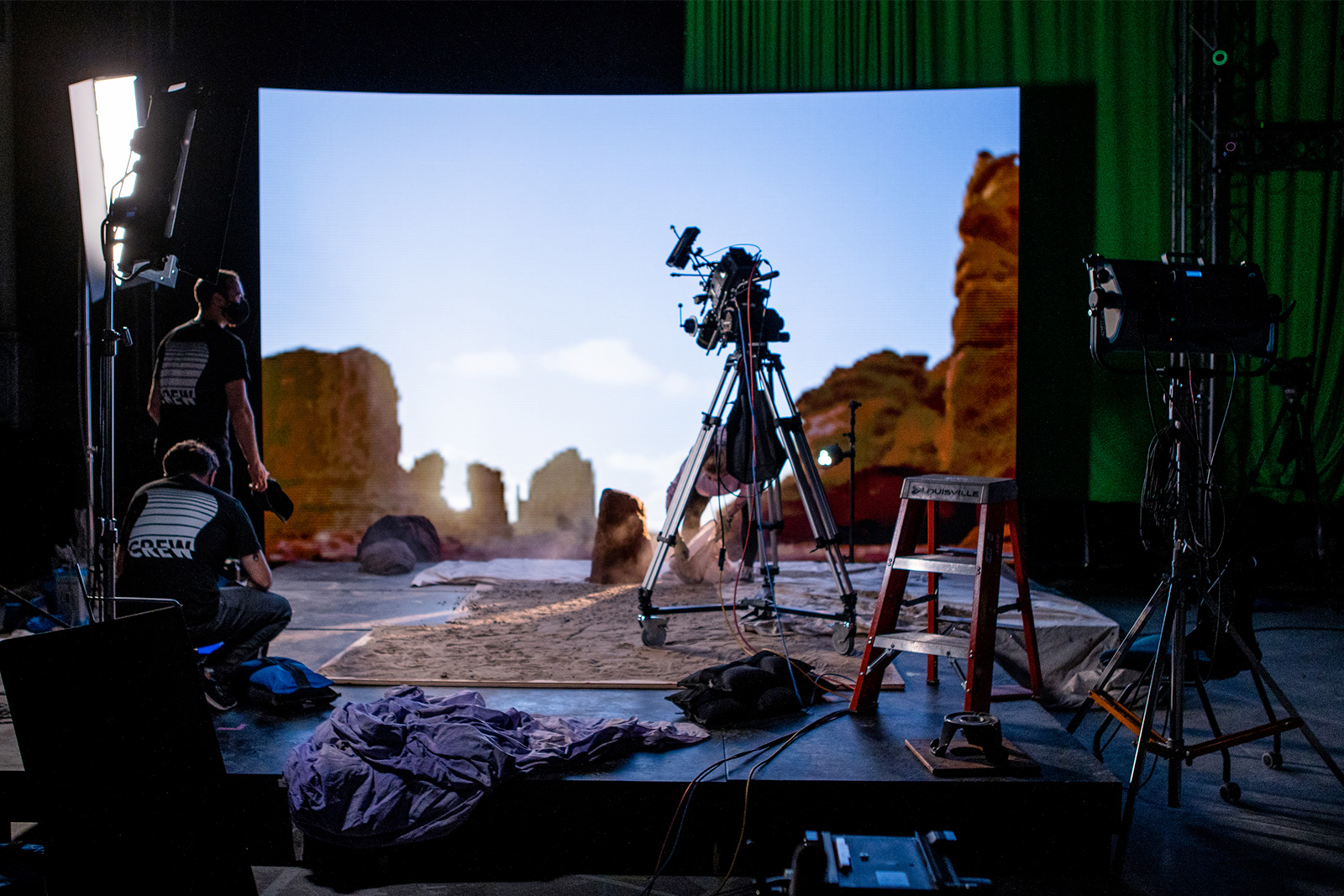
Sheridan’s Screen Industries Research and Training Centre (SIRT), a partner in our digital creation models exploration. Photo: SIRT
Performing Arts Program
The view from here
Sheridan’s Screen Industries Research and Training Centre (SIRT), a partner in our digital creation models exploration. Photo: SIRT
David Maggs Fellowship
Named as the Metcalf Foundation’s inaugural Fellow on Arts and Society in 2022, David Maggs continued to expand the ideas of his Metcalf Fellowship paper, Art and the World After This, to help Canada’s cultural sector secure a more viable future both for itself and for the communities in which it operates.
David developed an ongoing essay series focused on the different challenges the sector is facing — covering topics from the social impacts of art to its role in the climate crisis and the digital world — paired with interviews featuring relevant leaders from Canada’s cultural sector. These writings have developed a highly engaged national and international following in both policy circles and at the level of practice. David has also been regularly requested to deliver keynotes at significant cultural gatherings, including the International Performing Arts Centres Conference in Toronto, the Impact Investment Summit Asia Pacific in Sydney, Australia, and the International Society of Music Educators in Helsinki, Finland.
This fellowship has led to a new component of the Performing Arts program, New Pathways, designed to support arts organizations and the sector more broadly to take the necessary risks to explore the changes needed to thrive in a post-pandemic world. Focusing on challenges of relevance and viability, New Pathways is seeding a series of activities: investigating the potential of impact investing in Canada’s cultural sector in collaboration with the Canada Council for the Arts and the Ontario Arts Council; building climate capacity by developing a deeper grasp of art’s unique value proposition within the climate crisis and supporting organizations to work along such lines; and supporting digital creation models by helping arts organizations expand their creative activities through technology in order to meet new audiences and strike new partnerships.
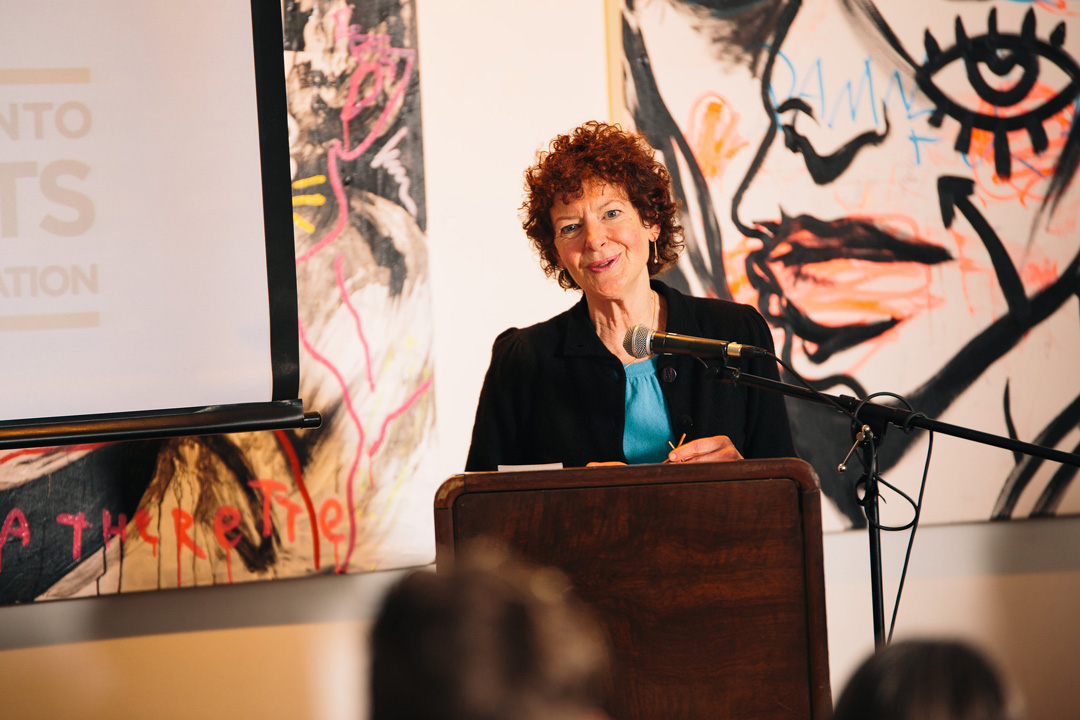
Jini Stolk. Photo: Sean Howard
The Jini Stolk Creative Fellowship
Jini Stolk, a venerated arts leader and champion, had a tremendous impact on the Toronto arts scene, including founding the Creative Trust. She dedicated her career to supporting the sustainability of arts organizations, and the often unheralded behind-the-scenes arts administrators critical for dynamic artistic work to flourish. We were honoured to contribute to The Jini Stolk Creative Fellowship, an endowment created in her memory to enable arts administrators to develop new ideas and pursue professional development for the benefit of the arts sector. Kevin Matthew Wong, Senior Producer and Artistic Associate with Why Not Theatre, was named the inaugural Jini Stolk Creative Fellow in 2023.
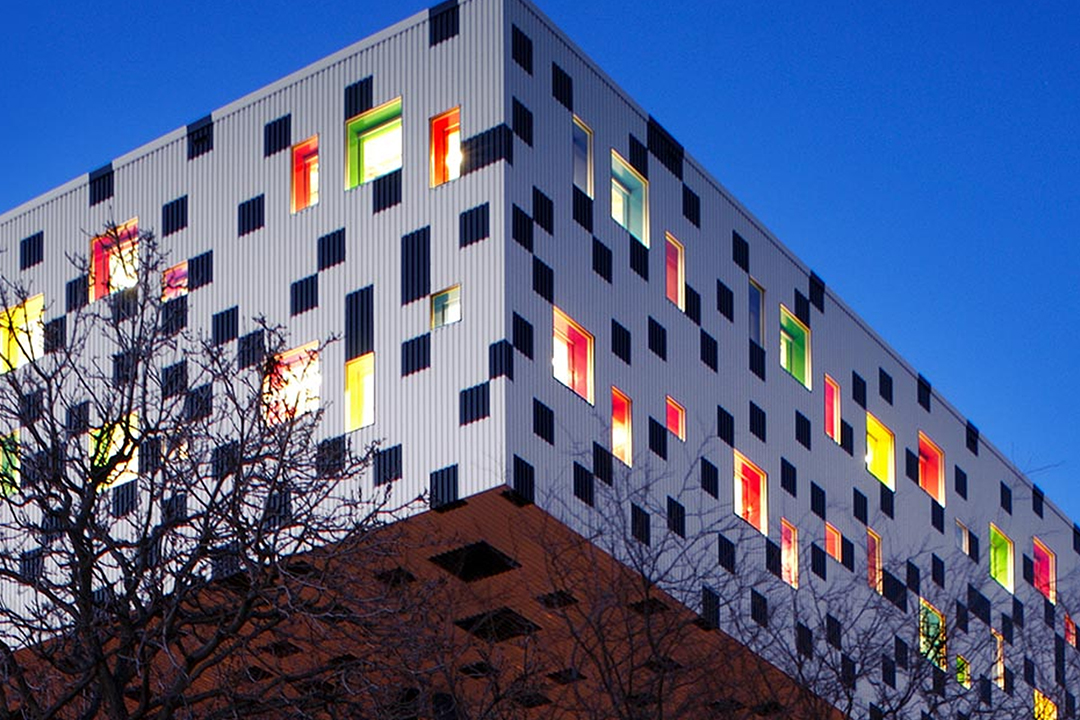
OCAD University's Rosalie Sharp Centre for Design. Photo: Julian Miles
OCAD Cultural Policy Hub and Public Imagination Network
A considerable gap in cultural policy capacity exists within the sector. Alongside several funding partners, we supported the launch of the Cultural Policy Hub at OCAD University, an aggregator for national cultural policy research, creation, and exchange developed to support capacity building and advance innovation through a closer collaboration between education, business, and the nonprofit sector. At the same time, we funded the Public Imagination Network, a project designed to catalyze artists as agents of systems change. Our interest in funding both projects was to see how we could close the gap between traditional institutional approaches and arts-based grassroots efforts at policymaking.

Photos: Paul Weeks (Vases), Shalan + Paul (Portraits)
Performing Arts
Johannas
The Johanna Metcalf Performing Arts Prizes/Les Prix Johanna-Metcalf des Arts de la scène (Johannas) is one of the largest unrestricted prizes for artists in Ontario, celebrating mid-career and early-career artists across multiple disciplines. The Johannas recognize artists who have made an impact on the field and the public, and show great promise in the ongoing pursuit of their ambitious and visionary practices. Established in 2019 and named in honour of Johanna Metcalf — who was at the heart of the Metcalf Foundation’s work for over 40 years — the biennial prizes amplify her legacy as a passionate supporter of the arts and artists, and is delivered in partnership with the Ontario Arts Council.
Photos: Paul Weeks (Vases), Shalan + Paul (Portraits)
2023 Johannas
From the 15 finalists, five winners were selected who each received a prize of $25,000. Each winner named a protégé who was awarded $10,000 and for the first time, each of the remaining 10 finalists received a prize of $2,000. The total value of the prizes was $195,000.
Learn more about the Johannas.
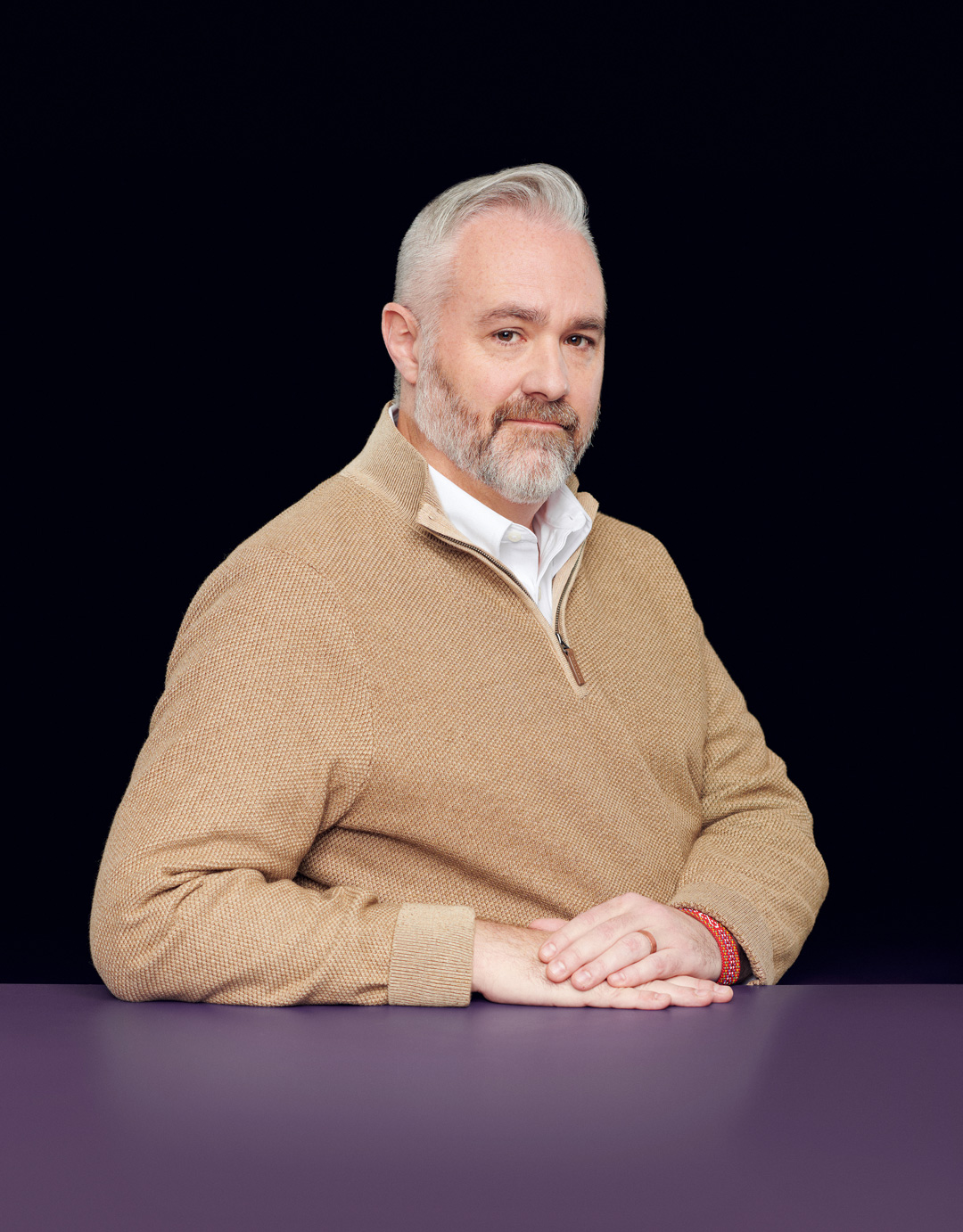
Keith Barker, a member of the Métis Nation of Ontario, is an award-winning playwright, actor, and Dora-nominated director from Northwestern Ontario.
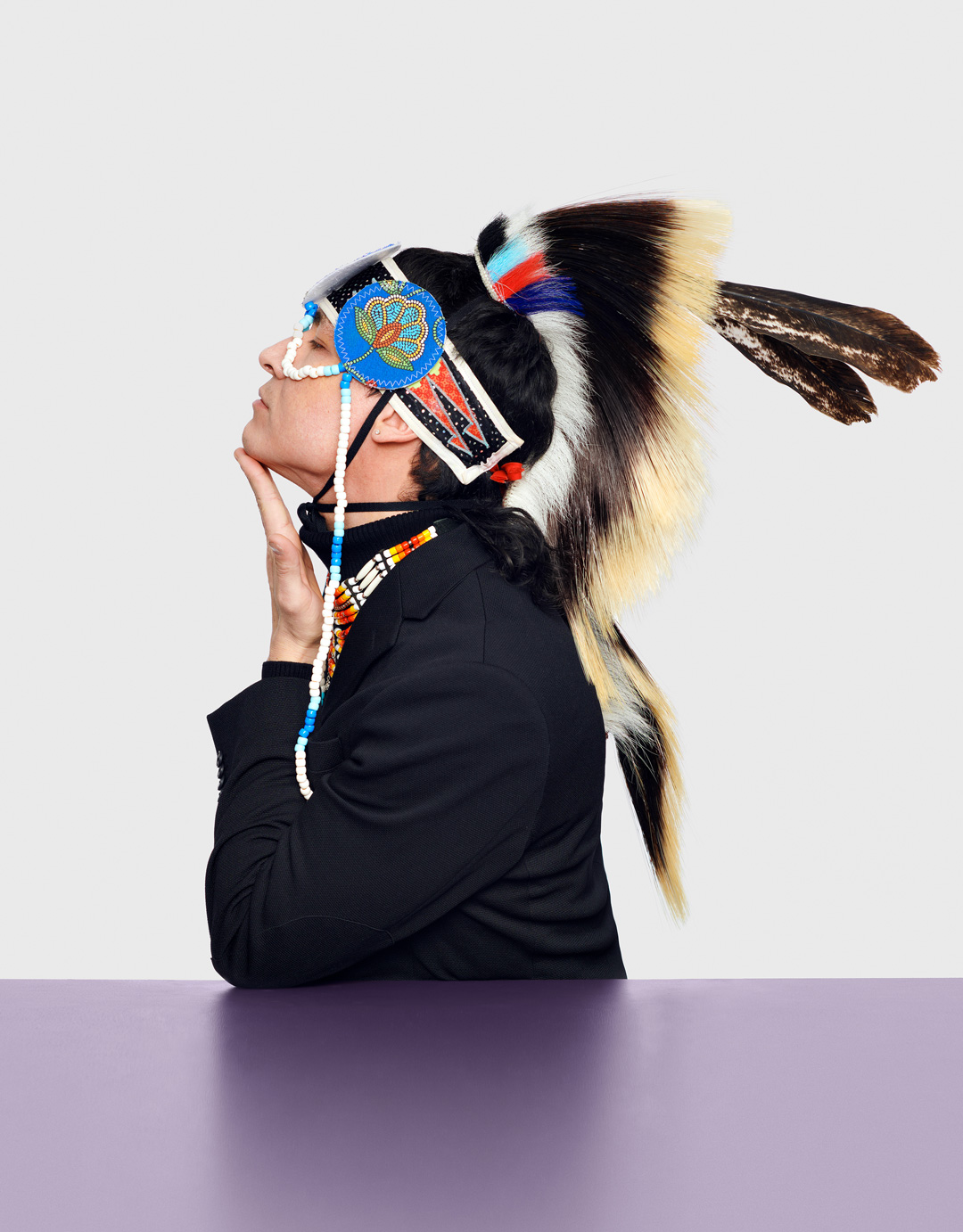
Chris Mejaki, protégé of Keith Barker, is an Anishinaabe actor and playwright, originally from Sagamok Anishnawbek with ties to Wikwemikoong and M’Chigeeng, Manitoulin Island.
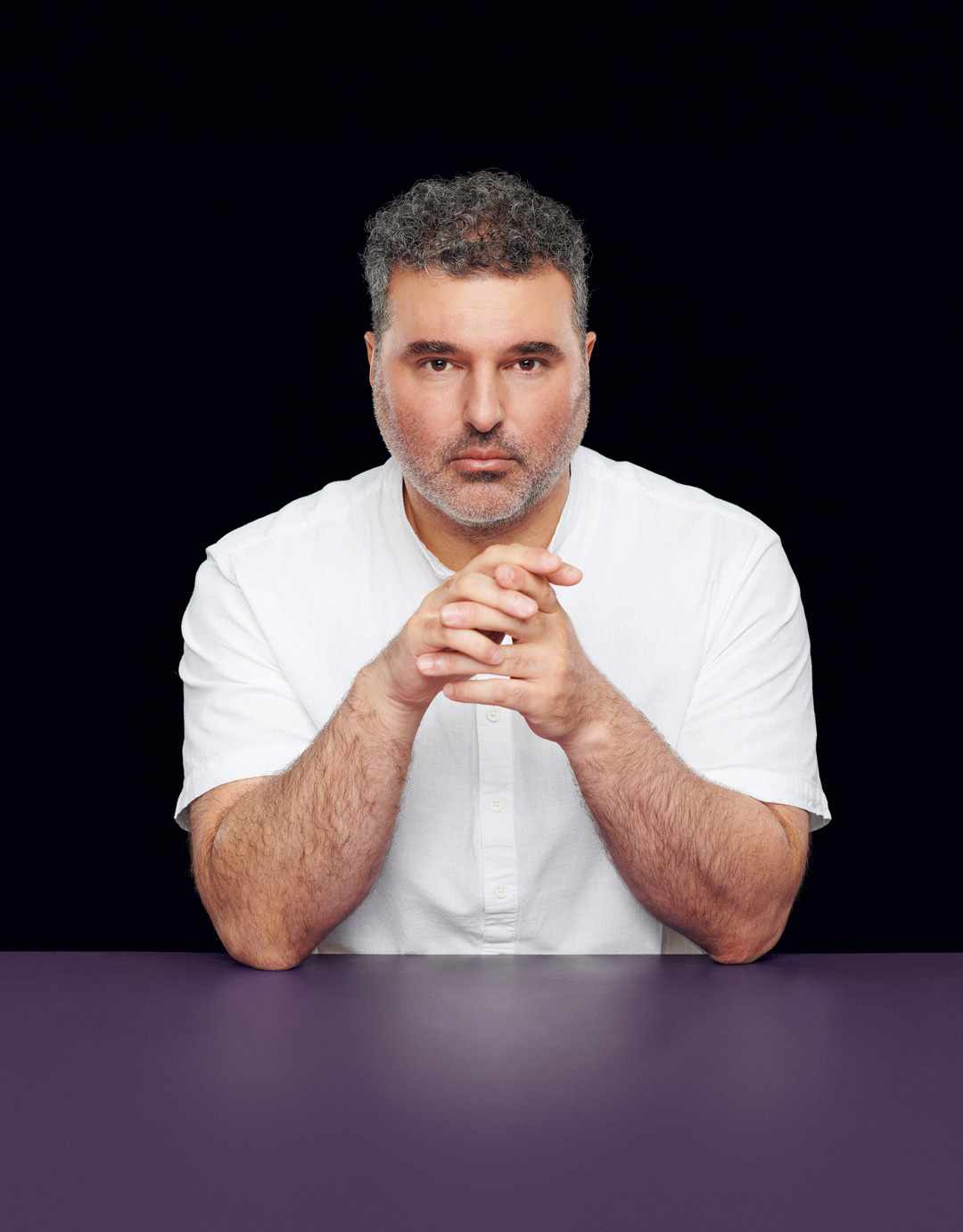
John Kameel Farah is a composer and pianist who embraces aspects of Baroque and early music, Middle Eastern music, improvisation, and all forms of electronic music.

Evan Pointner, protégé of John Kameel Farah, is a composer, recording artist, musician, and music educator based in Kitchener-Waterloo.

Natasha Powell is a Toronto native who has been working in the dance industry for 20 years with a soulful approach to movement.

Raoul Wilke, protégé of Natasha Powell, is a Toronto-based multidisciplinary award-winning artist, known internationally for his expressive and diverse style.
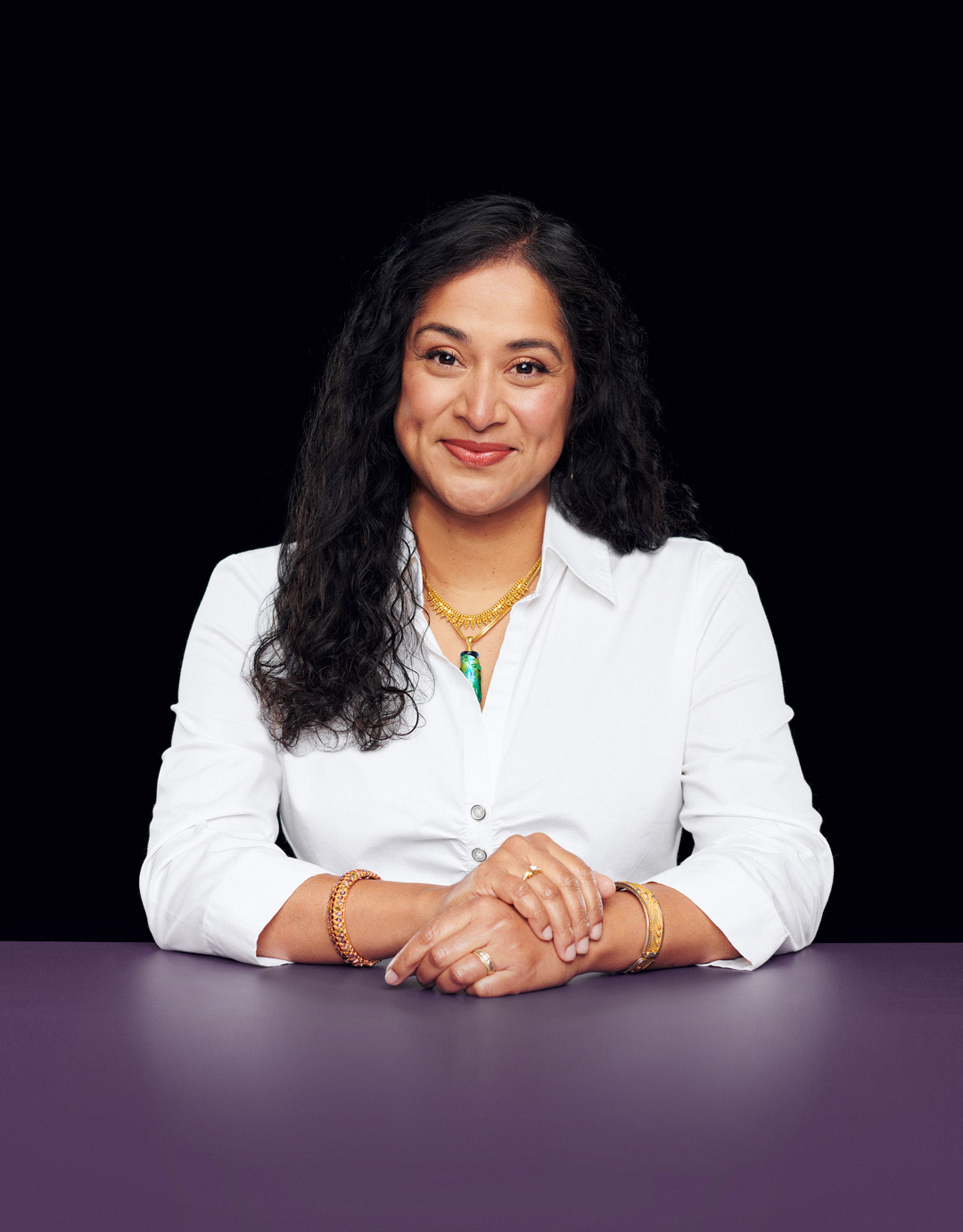
Suba Sankaran is a renowned Dora Award-winning, thrice JUNO-nominated world/fusion vocalist who effortlessly combines musical worlds.

Shirsha Chakraborty, protégé of Suba Sankaran, is an award-winning Indian alternative R&B singer-songwriter based in Brampton.

Roydon Tse is a composer and educator who seeks to communicate to audiences from all backgrounds, drawing inspiration from the urgent challenges posed by climate change, the complexities of grief, and the ever-evolving cultural tapestry of our dynamic world.
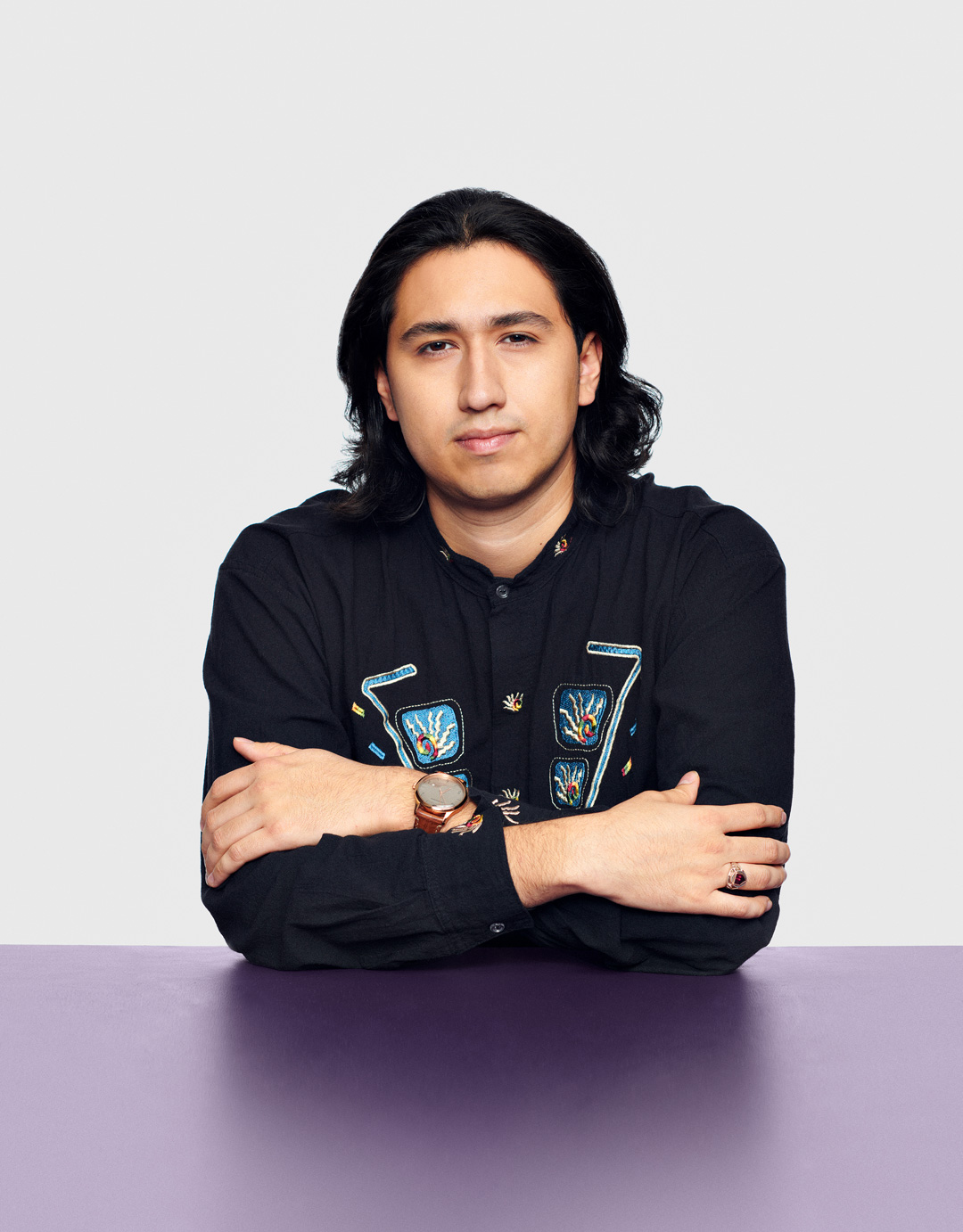
Sami Anguaya, protégé of Roydon Tse, is a Toronto-based singer and composer who creates music that blurs genre lines.

Grants
From 2022–2023, the Metcalf Foundation invested over $17 million in charitable activities.
Environment Grants
Inclusive Local Economies Grants
Performing Arts Grants
General Fund Grants
Board Member Initiated Grants

Impact Investing
Impact investments are investments made into companies, organizations, and funds with the intention to generate positive social or environmental impact alongside a financial return — it’s a way to do well by doing good.
Impact investing provides us with another way to make a difference with our money beyond our grantmaking. We believe we can accelerate our ability to achieve our mission by investing our financial assets directly in support of our goals.
Harnessing the power of our endowment to build affordable housing and community real estate, support microlending for job training and licensing, and develop clean energy and sustainable food companies, are examples of how we are putting capital to work for purpose beyond profits.
As of December 31, 2023, we have committed $9,300,000 in capital from our endowment towards impact investments.
Current Investments
Amplify Capital invests in technology companies that have the potential to scale to solve social and environmental challenges.
ArcTern Ventures invests in technology companies that have a positive impact on climate change and sustainability.
The CSI Spadina Community Bond enabled the Centre for Social Innovation to finance the acquisition and rehabilitation of a brick and beam building at 192 Spadina Avenue to expand its coworking real estate.
The Community Forward Fund provides loans to Canadian nonprofit organizations, charities, and nonprofit social enterprises across a wide variety of sectors including housing, the arts, renewable energy, food, and community spaces.
The Ilu Women’s Empowerment Fund invests in businesses that empower women and advance gender equality in Latin America and the Caribbean.
InvestEco invests in expansion-stage companies in North America that promote health and sustainability in the food and agricultural sector.
Renewal Funds invests in early growth stage companies focused on environmental innovation and sustainable consumer products.
The Mackenzie Greenchip Global Environmental All Cap Fund invests in companies in the following sectors: clean energy, energy efficiency, clean technology, water treatment and supply, sustainable agriculture, and sustainable transportation.
New Commons Development develops affordable housing and social purpose real estate to be stewarded by community-based organizations and maintained as affordable in perpetuity.
The NMF Rental Housing Fund partners with nonprofit and co-operative operators to invest in new-build or substantially renovated multi-family affordable rental housing.
The Neighbourhood Land Trust — the charitable arm of the Parkdale Neighbourhood Land Trust — owns and manages land in a community ownership model, collaborating with social housing partners to provide high quality affordable housing, supportive housing, and community economic development programs.
Raven Indigenous Capital Partners invests in early and growth stage Indigenous companies that support the ongoing revitalization of the Indigenous economy in Canada and the United States.
Windmill Microlending offers microloans to help skilled immigrants and refugees continue their careers in Canada.

Raven Indigenous Capital Partners
As social finance and impact investing gained steam throughout the 2010s and the availability of early-stage capital grew for many social purpose entrepreneurs, a gap persisted when it came to financing available to Indigenous-led start-ups.
Seeing the need and opportunity in Indigenous communities, Jeffrey Cyr, Paul Lacerte, and Stephen Nairne founded Raven Indigenous Capital Partners in 2018 to specifically invest in Indigenous enterprises in Canada and the United States. Headquartered in Vancouver, Raven is North America’s only Indigenous-led and owned impact investment firm.
Unique in the impact investing space, Raven provides patient capital along with culturally grounded support to Indigenous entrepreneurs — like Jenn Harper, the founder of Canada’s first Indigenous-owned cosmetics company, Cheekbone Beauty. Initially run out of Jenn’s basement, Raven’s $350,000 investment in 2020 helped her move Cheekbone’s operations into a 2,000 square foot warehouse in St. Catharines, build an in-house cosmetics lab, and hire a full-time chemist.
Born from a vivid dream Jenn had one night in 2014 of “two little girls who looked like me when I was small, with the rosiest cheeks,” Cheekbone is now a successful brand known for its sustainable products and values featured in InStyle, Marie Claire, and VOGUE.
Financial Information
| CONDENSED STATEMENT OF FINANCIAL POSITION AS AT DECEMBER 31, 2023 | ||
|---|---|---|
| 2023 | 2022 | |
| ASSETS | ||
| Cash and cash equivalents | 4,045,602 | 8,957,807 |
| Accrued interest and dividends receivable | 258,298 | 245,102 |
| Investments at market value | 169,508,043 | 176,488,615 |
| Other receivables and capital assets | 24,549,236 | 2,048,012 |
| 198,361,179 | 187,739,536 | |
| LIABILITIES | ||
| Accounts payable and accrued liabilities | 4,812,044 | 4,103,492 |
| NET ASSETS | 193,549,135 | 183,636,044 |
| CONDENSED STATEMENT OF REVENUE AND EXPENDITURES | ||
| REVENUE (LOSS) | 20,086,431 | (6,203,899) |
| EXPENDITURES | ||
| Investment-related | 422,727 | 422,837 |
| Other | 727,138 | 666,106 |
| 1,149,865 | 1,088,943 | |
| REVENUE BEFORE GRANTS | 18,936,566 | (7,292,842) |
| GRANTS AND DIRECT CHARITABLE ACTIVITIES | ||
| Performing Arts | 1,470,668 | 1,168,820 |
| Environment | 2,316,050 | 2,230,250 |
| Inclusive Local Economies | 2,439,311 | 2,489,136 |
| Special Initiatives | 1,212,500 | 1,192,000 |
| Direct charitable activities | 1,584,946 | 1,892,046 |
| 9,023,475 | 8,972,252 | |
| EXCESS OF REVENUE OVER EXPENDITURES | 9,913,091 | (16,265,094) |
| CONDENSED STATEMENT OF FINANCIAL POSITION AS AT DECEMBER 31, 2023 | ||
|---|---|---|
| 2023 | 2022 | |
| ASSETS | ||
| Cash and cash equivalents | 4,045,602 | 8,957,807 |
| Accrued interest and dividends receivable | 258,298 | 245,102 |
| Investments at market value | 169,508,043 | 176,488,615 |
| Other receivables and capital assets | 24,549,236 | 2,048,012 |
| 198,361,179 | 187,739,536 | |
| LIABILITIES | ||
| Accounts payable and accrued liabilities | 4,812,044 | 4,103,492 |
| NET ASSETS | 193,549,135 | 183,636,044 |
| CONDENSED STATEMENT OF REVENUE AND EXPENDITURES | ||
| REVENUE | 20,086,431 | (6,203,899) |
| EXPENDITURES | ||
| Investment-related | 422,727 | 422,837 |
| Other | 727,138 | 666,106 |
| 1,149,865 | 1,088,943 | |
| REVENUE BEFORE GRANTS | 18,936,566 | (7,292,842) |
| GRANTS AND DIRECT CHARITABLE ACTIVITIES | ||
| Performing Arts | 1,470,668 | 1,168,820 |
| Environment | 2,316,050 | 2,230,250 |
| Inclusive Local Economies | 2,439,311 | 2,489,136 |
| Special Initiatives | 1,212,500 | 1,192,000 |
| Direct charitable activities | 1,584,946 | 1,892,046 |
| 9,023,475 | 8,972,252 | |
| EXCESS OF REVENUE OVER EXPENDITURES | 9,913,091 | (16,265,094) |
The Metcalf Foundation office is located on the traditional territory of many nations including the Mississaugas of the Credit, the Anishnabeg, the Chippewa, the Haudenosaunee, and the Wendat peoples. Today, the meeting place of “Tkaronto” (Toronto) continues to be home to many Indigenous people from across Turtle Island and we are grateful to work together on this land.
38 Madison Avenue
Toronto, ON
M5R 2S1